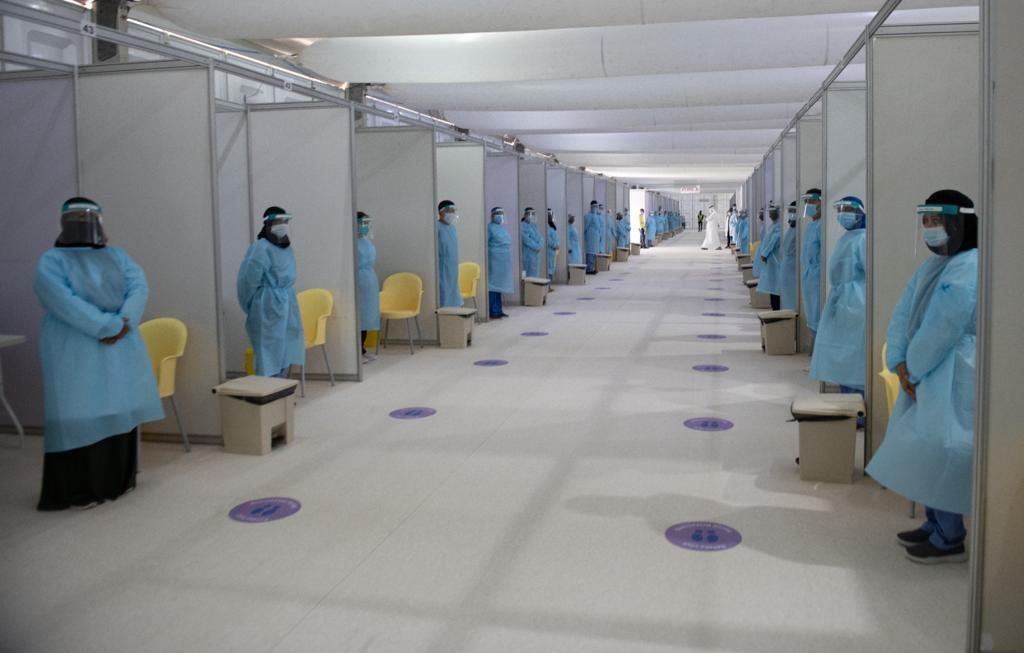Health authorities are encouraging eligible individuals to register for a third booster shot amid global concerns over increasing cases, but the World Health Organisation has been critical of countries giving a third dose while millions around the world remain unvaccinated.
Qatar’s Ministry of Public Health announced on Sunday that all individuals who received the second COVID-19 vaccine dose at least six months ago are now eligible for a booster shot.
Earlier clinical trials showed that the booster shot should be administered to those eligible eight months after receiving the second dose of Pfizer or Moderna vaccines.
However, as increasing scientific evidence shows that for most people, protective immunity obtained from the primary two vaccine doses gradually starts to decline after six months of administration, MoPH took the decision to reduce the duration between the administration of the second dose and the booster shot.
“All individuals who meet the new criteria are now eligible for the COVID-19 booster vaccine, regardless of age, and are encouraged not to delay their appointment to ensure they continue to have high levels of protection against COVID-19,” the ministry said in a statement.
Read also: Qatar’s third Covid-19 booster shot rollout sparks online discussion
The ministry outlined that the high rate of vaccination among the country’s population played a major role in helping authorities curb the spread of the virus. This also translated into the low numbers of daily cases in Qatar over the past months.
“However, there has been a slight increase in new daily cases in the past two weeks among people who were previously vaccinated, and this is a reminder that the fight against COVID-19 is not yet over,” MoPH warned.
On Sunday, Qatar recorded 124 new infections, raising the number of active cases to 1,634. So far, 611 people have died of Covid-19 in Qatar.
In the wake of the ongoing spread of the virus in several countries around the world, health authorities urged people planning to travel to register for the booster shot before traveling if they are eligible.
“All eligible individuals are encouraged to get the booster vaccine as soon as possible and no later than 12 months following the date of their second dose, to maintain their Gold Vaccinated Status on Ehteraz,” MoPH added.
People can register for the booster shot at all Primary Health Care Corporation health centers.
“PHCC is directly contacting people who are eligible for the booster vaccine dose to set an appointment,” the ministry said in a statement on Sunday.
Vaccination appointments can be made through the PHCC hotline or bilingual mobile application, “Nar’aakom”.
The health ministry noted that booster shots will only be given by appointment.
In line with the latest developments, Qatar’s track and trace Ehteraz app has been updated with an additional column showing information for the third dose.
The vaccine page on Ehteraz has been updated, showing whether the user has taken the third dose and the date of administration.
Read also: Vaccinated individuals ’29 times less likely’ to need hospitalisation: health official
Authorities have already warned those who do not take the third booster shot 12 months after taking their second dose would lose their “golden vaccinated” status on the mobile app.
As per the current restrictions in Qatar, the golden status is mandatory for those using public facilities, including restaurants.
WHO calls on halting booster shots
The World Health Organization (WHO) however has condemned countries for rolling out booster shots for their vaccinated populations while people in disadvantaged areas are yet to receive primary doses.
“Every day, there are six times more boosters administered globally than primary doses in low-income countries,” WHO chief, Tedros Adhanom Ghebreyesus said recently, stressing that “this is a scandal that must stop now.”
WHO has been reportedly calling for a halt on booster doses until the end of the year to free up jabs for poor nations.
In late August, Qatar’s health ministry approved the use of a third dose of Covid-19 vaccines for those with immunodeficiency diseases, noting these individuals may not get the level of immunity from a two-dose vaccine series compared to people who are not immunocompromised.
The immune response of vulnerable individuals to the initial vaccine shots could have weakened over time, it said previously.
The first phase of the booster programme focused on specific groups, including those over 65 years of age and vulnerable people with chronic conditions that increase their risk of a severe Covid-19 infection, as well as frontline healthcare workers and other sectors.
The booster dose is expected to aid individuals by significantly increasing their antibody levels against the virus and providing higher levels of protection against the different variants.
Follow Doha News on Twitter, Instagram, Facebook and Youtube







